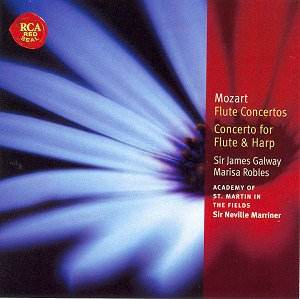Although there is no
doubting the calibre of any of the musicians
involved here, I personally find the
whole approach to Mozart on this disc
too polite and refined to be truly successful.
That said, Schnabel’s remark that Mozart’s
works should be played so that they
"flow like oil" characterises
these performances perfectly, so, if
that is the style you prefer, it is
very likely that you will succumb to
this discs charms more readily than
I did.
Nothing to be heard
on this disc is ever less than stylish
and flawlessly delivered. The ASMF’s
ensemble is, as always, immaculate and
the blend of the strings could not be
better judged. The same goes for Galway’s
flute tone; it is rich, perfectly tuned
and with not a hint of breathiness to
be found. Ultimately, though, I could
not help but feel that all of this smoothness
is rather counter-productive. It would
be brilliant for Debussy or Ravel (inseparable
horns and oboes - ideal for Impressionist
music), for example, but I feel that
Mozart should ideally have energy and
elegance in equal measure. Here, the
balance is too much in favour of elegance
and, while these pieces respond better
than much of Mozart would to this approach,
I still feel that a few more sharp edges
would not have gone amiss.
The very opening tutti
of Flute Concerto No. 1 is a
case in point. The strings all use a
healthy (although by no means excessive)
amount of vibrato but, as the
authentic instrument movement has shown,
a great deal of energy and lightness
can be generated from slimming down
the vibrato and making the rhythmic
framework of a piece more sharply etched.
Here, you can certainly hear the cellos
and basses, but crisper articulation
would have added a welcome degree of
freshness. The ‘full-bloom’ approach
is tailor-made for Galway’s playing.
He, too, uses plenty of rubato and,
as flute playing per se, it is
undeniably beautiful and bespeaks outstanding
musicianship. Over the duration of a
whole concerto (to say nothing of a
whole disc), though, it feels too rich
and unvaried and I felt that a lighter
tone in places would have been a welcome
contrast. If you compare Galway’s monochrome
approach to that taken by Emmanuel Pahud
in his EMI disc of these works, the
greater range of tone (varying from
the rich and heavy to the gossamer and
pure) at once demonstrates how much
more light and shade it is possible
to inject into these works. The slow
movements and finales are played as
one might expect given my comments above;
very slow in the case of the first Flute
Concerto, and delicate rather than
zippy in the case of the Flute Concerto
No. 2. The same goes for the Flute
and Harp Concerto, in which the
harp is pleasingly ‘present’. This performance
is, to my mind, the most successful
on the disc as the harp helps to cut
through the blandness of the strings.
All told, then, this
is a perfectly good and valid recording
of these works. The sheer beauty of
playing on offer is a tribute to all
involved but, as with almost any work
by a truly great composer, these works
have so much more than prettiness to
offer. If you are after a background
music disc, or if you know and like
these artists, this is a perfectly good
option. If, like me, you object to Mozart
being given the ‘Dresden china’ treatment
and feel that this reduces his works
to something akin to pretty triviality,
you will want to look elsewhere. The
Naxos disc of these works (with Patrick
Gallois) is a very viable alternative
for a modern-instrument performance
of these lovely works and sheds far
more light on their freshness than this
present recording, as does Emmanuel
Pahud on EMI.
Em Marshall


